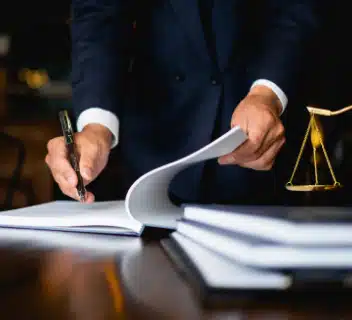Essential Steps: What to Do After a Motorcycle Accident
Wondering what to do after a motorcycle accident? This guide walks you through the crucial steps: ensuring safety, calling for help, documenting the scene, and more. Read on to protect your well-being and legal rights.
Key Takeaways
- Immediately assess safety and injuries after a motorcycle accident, moving to a secure location and contacting emergency services as needed.
- Thoroughly document the accident scene, including taking photos, gathering witness information, and obtaining a police report to support future claims.
- Seek prompt medical attention and notify your insurance company to initiate the claims process, while also considering legal advice to protect your rights.
Prioritize Immediate Safety
In the chaotic moments following a motorcycle accident, prioritize immediate safety. Assess everyone involved for injuries, both visible and delayed, and then move to a secure location to prevent further accidents.
Once in a safe place, calling 911 to report the accident and seek medical attention is crucial.
Check for Injuries
Wondering what to do after a motorcycle accident? Immediately after a motorcycle accident, check yourself for any injuries. Injuries can range from visible cuts and bruises to more severe conditions like broken bones, paralysis, or traumatic brain injuries. Once you’ve assessed your own condition, check on the injured motorcyclists involved in the motorcycle crash to assess their injuries. Be aware that motorcycle accidents can lead to serious consequences.
Identify both visible and delayed symptoms that may require medical attention. While some injuries, like cuts and fractures, are immediately noticeable, others, like internal bleeding or brain injuries, may not show symptoms right away. Early recognition can be life-saving and is crucial for medical and legal purposes.
Remember, even if you feel fine, a medical evaluation is necessary to rule out any hidden injuries.
Move to a Safe Location
If possible, move to a secure area away from traffic to prevent further accidents or injuries. This minimizes risks from ongoing traffic and potential hazards. Creating distance from the accident scene helps mitigate the risk of additional incidents.
If individuals do not require immediate medical attention, move them to safety. However, be cautious when moving those who might suffer greater injuries from movement.
Call 911
Once you and others are safe, call 911. Contacting emergency services is vital if there are significant injuries or property damage. When calling, provide the following information to the emergency responders:
- Your location
- The type of accident
- Details about the nature of injuries. Remaining calm and collected while providing this information can help ensure a quick and efficient response.
What to do after a motorcycle accident: follow these steps:
- Notify law enforcement to ensure they can document the incident for legal purposes.
- When the police arrive, provide your identification, registration, and insurance proof.
- Obtain a detailed police report, which is crucial for your motorcycle accident claim as it documents evidence and testimonies related to the incident.
Document the Accident Scene
Document the accident scene meticulously to support future insurance claims and legal actions. Gather comprehensive evidence, such as accident conditions and other drivers’ details. This involves taking photos, gathering witness information, and obtaining police report details.
Take Photos
Photographs should capture vehicle positions, damage, and any visible injuries to provide comprehensive evidence of the vehicles involved and other vehicle details. Take pictures of the accident scene and crash scene before authorities arrive, including license plate numbers, street signs, vehicle positions, and any possible causes of the accident.
These photos can be invaluable when pursuing compensation and clarifying details of the incident.
Gather Witness Information
Witnesses can provide crucial corroborative details or alternative accounts of the incident. Talk to witnesses and collect their names and contact information for future statements.
Their testimonies can significantly strengthen your case by offering an unbiased perspective on the accident.
Obtain Police Report Details
An official police report serves as an unbiased document that can significantly support insurance claims and establish fault. Typical details included in a police report after a motorcycle accident are:
- The accident location
- Names of involved parties
- Witness statements
- Any citations issued.
Obtaining the officer’s business card or contact information for the official accident report is essential for follow-ups.
Exchange Information with Involved Parties
After ensuring everyone’s safety and documenting the scene, exchange information with the other parties involved. Collect:
- Driver’s license details
- Vehicle registration
- Insurance provider
- Policy numbers from other drivers involved in the accident.
This information is crucial for legal and insurance purposes. That being said, do be careful not to admit fault or have detailed discussions about what happened.
Collect Driver Information
Gather information on everyone involved in the motorcycle accident, including driver’s license information, motor vehicle registration, insurance provider, policy number, and license plate numbers.
Ensure that the collected information is documented clearly to avoid disputes later with insurance companies or during legal processes.
Avoid Admitting Fault
Do not admit fault at the accident scene. Share only necessary information with authorities to protect your legal rights.
Avoid discussing specifics or admitting liability; only share necessary information with authorities.
Seek Medical Attention Immediately
After a motorcycle accident, focus on health and seek immediate medical attention. Even if you feel fine, prompt medical attention can identify injuries that may not be immediately apparent.
Visit a Doctor or Hospital
Injuries that may not show signs right away and can remain hidden immediately following a motorcycle accident include:
- Internal injuries
- Internal bleeding
- Concussions
- Nervous system injuries
- Head trauma
Documenting injuries is critical for supporting financial compensation claims.
If first responders clear you to leave after a motorcycle accident, seek further medical exams and opinions.
Follow Medical Advice
Adhering to follow-up appointments is essential for tracking recovery and substantiating claims. Engaging in self-care activities like meditation and physical exercise can significantly enhance emotional recovery.
Notify Your Insurance Company
Notifying your insurance company about an accident starts the claims process and helps assess potential coverage. Notify your insurance company as soon as possible after an accident to allow them to investigate the claim promptly. Do be aware, however, that the insurer is not your ally. Any statements you make (even minor ones) can and will be used to undermine your claims and even potentially reject them. That’s why we recommend not having “detailed” discussions about the accident with your insurer until first consulting a qualified attorney.
Provide Accurate Details
Provide detailed and accurate information about the collision. When reporting the accident, include the date, time, location, and names of other parties involved.
Document essential evidence such as photographs, police reports, and medical evaluations to gather evidence to support your claim.
Understand Your Policy
Knowing your car insurance policy’s coverage limits prevents settling for less than what you are entitled to after an accident. Reviewing your insurance policy before filing an insurance claim helps clarify what benefits and compensation are available.
Consult an Experienced Motorcycle Accident Attorney
Consult an attorney at a law firm to understand your rights and navigate the legal process after a motorcycle accident. An experienced attorney can help with complex laws, negotiate with insurers, and ensure fair compensation.
Schedule a Consultation
Consult a motorcycle accident attorney after a serious accident, especially before giving detailed statements to the insurance company. Many attorneys offer a free consultation, allowing victims to discuss their motorcycle accident cases without initial costs.
Contact 1-800-THE-LAW2 today for a free consultation with a motorcycle accident attorney in our network.
Protect Your Rights
An experienced motorcycle accident attorney can help you understand your legal options and work to protect your rights. They can assist with gathering evidence and managing complex communications with insurance companies. If you have been involved in a motorcycle accident, consulting a personal injury attorney or motorcycle accident lawyer can be beneficial.
Keep Detailed Records
Maintain thorough documentation of all aspects related to the accident. Your accident file should include a police report, medical records, repair estimates, and witness information.
Record Medical Expenses
Keep a record of the following for thorough documentation:
- All medical records
- Bills
- Diagnostic test results
- Doctors’ notes
- Appointment reminders
Comprehensive medical documentation is vital to prove the extent of injuries and create an accurate paper trail for all medical treatment and medical expenses incurred.
Document Lost Wages
To track lost income after an accident, ask your employer for a letter confirming missed work and your average earnings; if self-employed, gather documents like invoices and tax returns.
Document daily pain, emotional distress, and the impact of your injuries on daily life and relationships to capture the full extent of the effects from the accident.
Maintain an Accident File
Maintaining an accident file ensures you have all the necessary information and documentation related to the incident. Organize all relevant documents, including police reports, medical records, and repair bills, for any potential claims or legal actions.
Manage Emotional Recovery
Focus on health, document everything, and be kind to yourself during your recovery process.
Common emotional reactions after a motorcycle accident include anxiety, fear, and depression.
Seek Counseling
Therapy is effective in reducing feelings of anxiety and depression, promoting mental health after an accident. Support groups provide a platform for accident survivors to share experiences and find comfort in the community.
Practice Self-Care
Address emotional trauma resulting from the motorcycle accident to support overall recovery.
Consider therapy or support groups to cope with anxiety, depression, or PTSD that may arise after the accident.
Be Aware of Legal Deadlines
Each state has unique deadlines for filing personal injury claims, so it’s important to be informed.
State-specific accident laws can affect your claim.
Know Your State’s Laws
The statute of limitations for personal injury claims varies across U.S. states; some allow as little as one year, while others extend to six years. Be aware of these deadlines to manage your legal rights effectively.
Consult an attorney familiar with your state’s laws to seek legal counsel and avoid missing critical filing deadlines.
Summary
Navigating the aftermath of a motorcycle accident can be overwhelming, but knowing the essential steps to take can make a significant difference. Prioritize immediate safety, document the accident scene, seek medical attention, notify your insurance company, consult an experienced attorney, keep detailed records, manage emotional recovery, and be aware of legal deadlines. These actions will not only protect your health but also strengthen your legal and insurance claims. Stay informed, stay safe, and take proactive steps to ensure your rights and well-being are protected.
Frequently Asked Questions
Immediately after a motorcycle accident, prioritize your safety by checking for injuries, moving to a safe location, and calling 911 for medical assistance. Taking these steps can help ensure your well-being and facilitate the necessary response.
Documenting the accident scene is vital as it provides essential evidence for supporting insurance claims and legal proceedings. This includes capturing photos, gathering witness information, and obtaining a police report.
Yes, seeking medical attention after an accident is crucial, as some injuries may remain hidden initially and could lead to long-term issues if not addressed. Prioritizing your health is essential, even if you feel fine.
An experienced motorcycle accident attorney can effectively navigate complex legal issues, negotiate with insurance companies, and gather crucial evidence to ensure you receive fair compensation for your injuries and damages. Their expertise is invaluable in maximizing your claim.
The legal deadlines for filing personal injury claims, known as statutes of limitations, differ by state. Consulting with an attorney is essential to ensure compliance with these timeframes.




